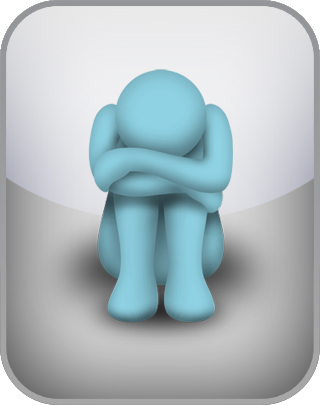Academically reviewed by Dr. Jennifer Schulz, Ph.D., associate professor of psychology
Loneliness Test
Humans are social animals. Social connections are important for our sense of well-being, and feeling lonely functions as a pain signal that alerts us to the fact that something is wrong. As a consequence, loneliness is significantly correlated with measures of negative self-perception, anxiety, and depression.
Based on the work of Dr. Davis Tharayil, Ph.D., this test will determine your level of loneliness. Are you lonely? For each of the following statements, indicate your level of agreement below.
Question 1 of 25
I feel alone even in a group.
| Disagree | Agree |
NEXT
The IDRlabs Loneliness Test (IDR-LT©) was developed by, and is the exclusive property of, IDRlabs International. The IDR-LT is based on the work of clinical psychologist Dr. Davis P. Tharayil, PhD, and the University of the Philippines Loneliness Assessment Scale, but it is not in any way associated with Dr. Tharayil nor any other professionals or professional bodies affiliated with this written work.
The test provides the following feedback: Not Lonely: You very rarely experience loneliness. You enjoy a wide variety of social relationships and feel close and connected to others on a deeper level. These others may include family, friends, co-workers, partners, and acquaintances. You might maintain social connections in your neighborhoods, through community activities, online, or in-person. Whether you have a bad day or a good one, you know there will always be someone you can talk to. You feel loved, cared for, and seen, and you are able to reciprocate these feelings in turn. People who do not feel lonely also typically have better overall mental health while benefiting from greater empathy for others and higher self-esteem.
Mild Loneliness: You experience only mild or occasional loneliness. Everyone feels lonely from time to time, and when you do, there are usually people you can turn to for social connection and support. In your case, you are not liable to feel lonely for extended periods of time or to an extent that impacts your general well-being. You have meaningful connections and relationships in your life; when you reach out to someone, it’s reciprocated more often than not, and you’re capable of connecting with others on a deeper, more intimate level. People who feel connected to others have lower levels of anxiety and depression. Moreover, studies show low levels of loneliness are related to increased empathy for others and greater self-worth.
Moderate Loneliness: You experience moderate levels of loneliness. While there are times you experience meaningful social connections, you also spend a significant amount of time feeling alone or left out. You may notice that some of your friendships or relationships never seem to move past engagement at a surface level, and you may not have anyone you can identify as your closest or best friend, though this is likely something you wish you had. You might also struggle with feelings of sadness, anxiety, or low self-worth. You may benefit from actively working to engage with others in a positive, healthy way, and you could possibly attempt to forge new bonds through activities like volunteering, hobbies, workout groups, etc.
High Loneliness: You are currently experiencing a high degree of loneliness and social isolation. You struggle to connect with others and often feel alone regardless of whether you actually are. Though you may have casual friends or acquaintances you can engage with, you don’t have many common interests or values, and the people in your life don’t seem to really understand you. Trying to connect socially may feel exhausting and fruitless at times, and even negatively impact your self-esteem and self-worth. Chronic loneliness can affect your health in other areas as well. Be careful if you are struggling with chronic feelings of loneliness and isolation.
Professionals in the field of psychology, who are well-versed in the use and scoring of various psychometric tests and measures of personality, have developed the IDRlabs Loneliness Test. The present test was informed by Dr. Tharayil and his written work, published as Tharayil, D.P. (2012). Developing the University of the Philippines Loneliness Assessment Scale: A Cross-Cultural Measurement. Social Indicators Research, 106, 307-321. The present test is intended for educational purposes only. IDRlabs and the present IDRlabs Loneliness Test are independent of the above researcher, organizations, or their affiliated institution.
Online quizzes such as the present Loneliness Test, whether they are professional, educational, or primarily for entertainment purposes, can only provide first takes of some specific facets of your individual character and personality. In regard to the current test in particular, your responses and resultant overall score will provide information about your current experience of loneliness. Despite the thorough and systematic nature of the present test’s development and construction, no test ever created can determine your personality, character, or degree of social isolation with total accuracy, nor can it replace a definitive personality, attitude, or relationship assessment made by a qualified, pertinent professional.
As the developers and publishers of this free Loneliness Test, which allows you to screen yourself for feelings of loneliness and social isolation, we have striven to make this test as reliable and valid as possible by subjecting it to statistical controls and validation. However, free online quizzes such as the present Loneliness Test do not provide professional assessments or recommendations of any kind; the test is provided entirely “as-is.” For more information about any of our online tests and quizzes, please consult our Terms of Service.

 English
English  Español
Español  Português
Português  Deutsch
Deutsch  Français
Français  Italiano
Italiano  Polski
Polski  Русский
Русский  Türkçe
Türkçe  العربية
العربية  한국어
한국어  Bahasa
Bahasa 